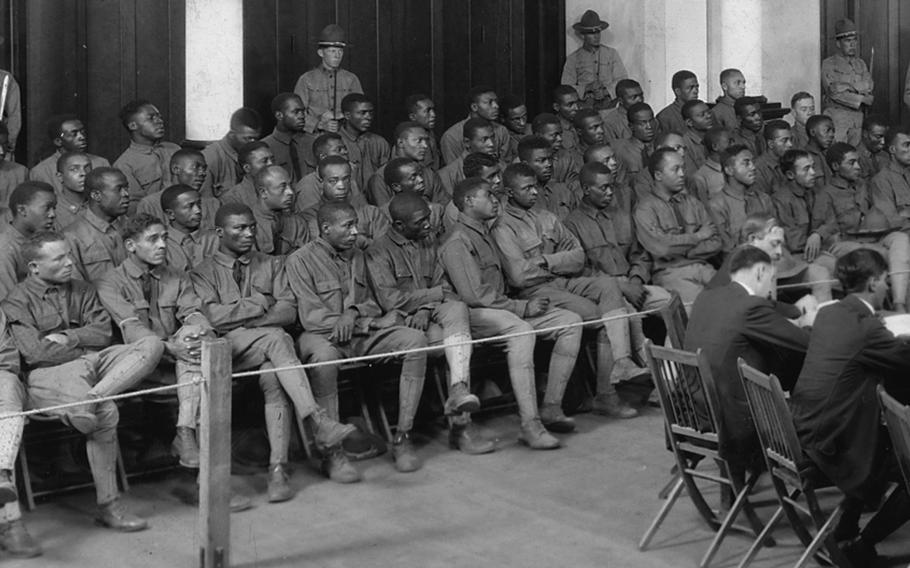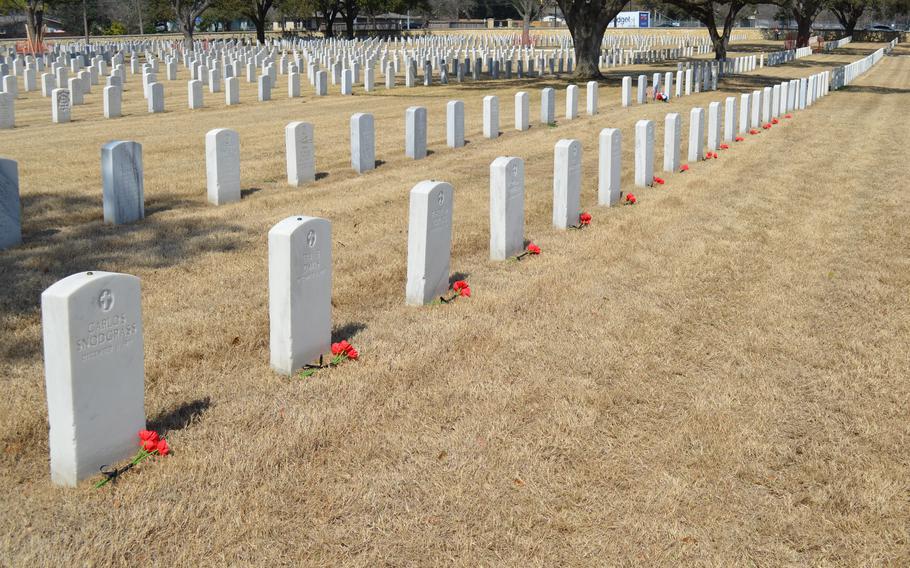
Defendants on trial during the first court-martial at Fort Sam Houston, Texas, in November 1917. The Army on Monday reversed the convictions of 110 Black soldiers charged more than a century ago for mutiny, murder and assault in the 1917 Houston Riot. (National Archives and Records Administration)
WASHINGTON — The conviction of 110 Black soldiers charged more than a century ago for mutiny, murder and assault in the 1917 Houston Riot has been overturned, the Army announced Monday.
“After a thorough review, the [Army Board for Correction of Military Records] has found that these soldiers were wrongly treated because of their race and were not given fair trials,” Army Secretary Christine Wormuth said in a prepared statement. “By setting aside their convictions and granting honorable discharges, the Army is acknowledging past mistakes and setting the record straight.”
In the summer of 1917, the 3rd Battalion of the 24th Infantry Regiment was sent to Houston to guard Camp Logan, one of many training sites that the Army established during World War I. The unit was part of the Buffalo Soldiers, the nickname given to Army regiments of Black troops who served beginning in 1866. Racial tensions began immediately between the Black soldiers and white Houston police officers through ongoing slights and open hostility that built into a volatile incident.
On Aug. 23, 1917, tensions boiled over culminating in a two-hour riot through the city. Four soldiers and 15 white civilians and police officers died.
On the day when the riots broke out, it began with the arrest of a Black woman by white police officers, James Jones III, an associate professor of history at Prairie View A&M University, said in February 2022. A private from the battalion intervened and offered to help the woman, but police officers beat him and arrested him. Cpl. Charles Baltimore went to inquire about the private, only to be beaten and arrested himself.
Rumors circulate at Camp Logan that Baltimore had been murdered, which caused members of the battalion to react, Jones recounted. At about the same time, soldiers believed a group of armed white people were heading toward the base.
More than 100 seized weapons and left camp thinking they were marching in their own self-defense, Gabe Camarillo, undersecretary for the Army, said Monday during a ceremony at the Buffalo Soldiers National Museum in Houston.

Of the 19 soldiers found guilty of mutiny and hanged following the Houston Riot of 1917, 17 are buried at Fort Sam Houston National Cemetery in San Antonio, Texas. The Department of Veterans Affairs unveiled a new sign in February 2022 that tells the story of these men. The Army on Monday reversed the convictions of 110 Black soldiers charged more than a century ago for mutiny, murder and assault in the 1917 Houston Riot. (Rose L. Thayer/Stars and Stripes)
After the riot, the Army orchestrated the first of three courts-martial at Fort Sam Houston for 118 Black soldiers charged with mutiny and murder, among other lesser charges. They were all represented by one Army officer who had some legal experience but was not a practicing attorney. After the three trials, 19 soldiers were hanged.
The first trial lasted 29 days, the court deliberated for two days and delivered the first of 58 convictions against the soldiers, Camarillo said. Less than 24 hours later after an internal review of the verdicts, 13 soldiers were hanged.
“It was the largest mass execution of American soldiers ever carried out by the Army,” Camarillo said.
By September 1918, 52 additional convictions and six more executions would follow. Camarillo said, even then, the Army recognized the injustices it had perpetrated on its own soldiers.
As part of the Army’s announcement overturning the convictions and granting honorable discharges, he said the Army has also worked with the Department of Veterans Affairs on providing benefits to the relatives of soldiers who might be entitled to them.
“Today, the legacy of these soldiers … protecting freedoms that they themselves could not enjoy, is being respected and uplifted,” said Jason Holt, a descendant of Pfc. Thomas Hawkins who was one of the 13 hanged. “I pray with all my heart, that their souls witness these moments of reckoning and are set free.”
Early in February 2022, the Army began a review process of the trials. The request to review the case came not just from family members of those who died, but also retired general officers.
Later that month, a sign was unveiled at Fort Sam Houston National Cemetery in San Antonio, Texas, meant to educate visitors on the events known as the Houston Riot and the Camp Logan Mutiny of 1917. Seventeen of those 19 men were eventually buried at Fort Sam Houston under gravestones that only bear their names and death dates, which was customary at the time for executed soldiers. The gravestones stand in contrast to those around them because they lack rank and service branch, birth dates and any wars in which the troops served.
Matthew Quinn, undersecretary of memorial affairs at the Department of Veterans Affairs, said new headstones to those buried there would be provided if families desire. For soldiers not buried at a national cemetery, he said the VA would do what it can to memorialize them properly.
As part of the closing of Monday’s ceremony, Army Brig. Gen. Ronald Sullivan read to the audience the words that will be added to the sign at Fort Sam Houston.
“The Army viewed the cases in 2023 and determined the widespread racism and tension that triggered the 1917 Houston Riot pervaded the trials for these soldiers, making their trials unfair,” he read. “The Secretary of the Army set aside all convictions and directed the soldiers’ records reflect honorable discharges.”